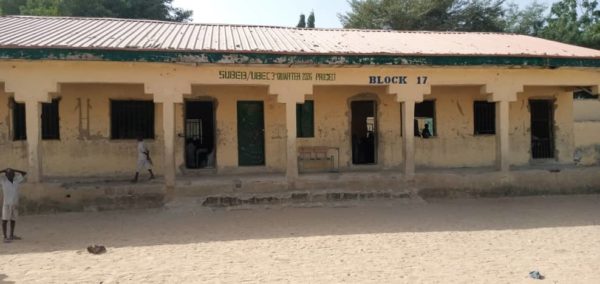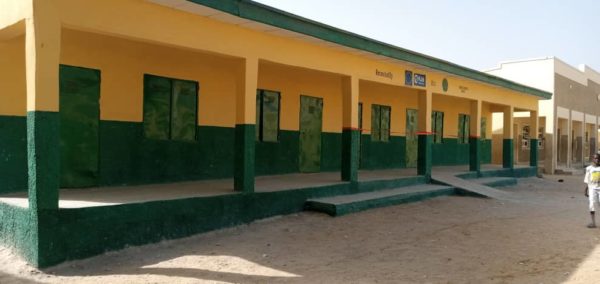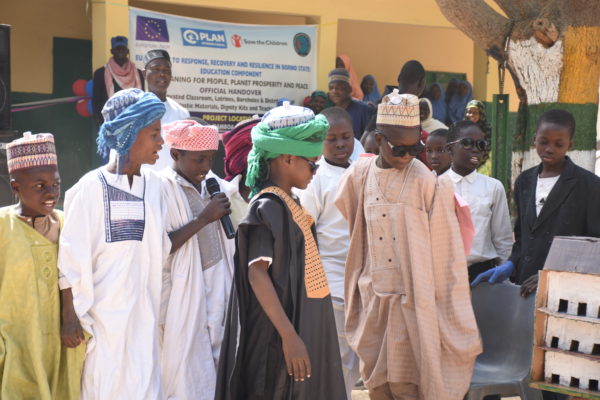From the window of my room in the UN humanitarian hub in Maiduguri, northeast Nigeria, I can almost feel the dry Saharan wind blowing outside. The weather is surprisingly nice – sunny and warm, not as hot as it was the last time I visited here when the temperature was over 40 degrees. We are finishing the 1st year of an education project in Borno State – funded by the EU – and I am here to monitor how the work is going.
From the journey from the airport we are instantly reminded of the high insecurity in this State. Heavily armed police and army are everywhere on the roads of Maiduguri, the capital city and the only town in the State where Boko Haram hasn’t penetrated.
Over the years, Boko Haram has fought against formal education by destroying schools and kidnapping teachers and children. Their activities have caused the death of 611 teachers, the displacement of 19,000 teachers, the damage or destruction of 910 schools and the closure of a further 1,500 schools. Already suffering from forced early marriage, girls make up 70% of the number of out-of-school children.
My trip coincides with the International Day for Education, a day that aims to honour education and its centrality to people, planet, prosperity and peace. I am reminded of the importance of the latter as I travel through an area so affected by conflict. It strikes me that in a world with record high numbers of displaced people (70.8 million people) that we must not forget everyone’s human right to education.
Displacement and migration is a significant barrier to
people’s right to education that affects countries all around the world. Humanitarian responses tend to focus on the provision of shelter, food, and sanitation, but when children and young people miss out on education they reduce their opportunities for recovery and self-reliance later in life.
I remember watching an interview of a 16-year-old Syrian boy, who was displaced, and he told the journalist that the thing he missed most was going to school. Going to school for children affected by emergencies provides them with normalcy, allows teachers to identify children who have been traumatised and are suffering with PTSD. Children can then be referred to receive the support they need to overcome an enormously difficult period of their life – something that is incomprehensible for those of us who are lucky to live in a safe environment.
Providing opportunities for education to start, or continue in emergencies provides a safety net for girls and boys. They are able to remain safe while learning and increasing the probability of them escaping poverty. And so, Plan International, with funding from the EU, is implementing an education project in Nigeria so that once-displaced families are able to return to their communities and recover much more quickly.
Normally, from the office in Dublin, I work on the EU project providing support to the team in Nigeria. So while I get to compose, review and edit documents back home, here, on a monitoring visit I discuss with the staff any challenges we are facing with the implementation of this project and visit the schools sites that have been renovated so far. Unfortunately, due to the high insecurity in the state, I can only monitor what the project is doing in the capital city. My Nigerian colleagues are the ones travelling all over the State ensuring that the project proceeds well and that more and more children can have access to safe, quality education.
On my first day in Maiduguri, on Sunday, we head to visit three schools in town to see the classrooms and latrines that have been built (see before and after pictures below). Two of those schools are filled with children even on Sunday. In fact, during the weekend they host Sangaya schools. These are Islamic schools where normally children learn the Koran, however, thanks to the project, students from 40 Sangaya schools have now also started literacy and numeracy classes.
The vice Head Master accompanies me and my colleagues to the 9 rehabilitated classrooms and the 10 newly built latrines, the first that the school has ever had. This school hosts 18,000 children from pre-primary to secondary level and it didn’t have a single latrine before!
School before:

School After:

Ten latrines are still not enough for the pupils but our project made the Government aware of the school needs who then built 20 more latrines. This is what in programme jargon we call a project ‘unexpected outcome’, something that we didn’t plan but that it wouldn’t have happened without our project.
The children are also learning about hygiene and sanitation to reduce the incidence of water borne diseases so that attendance in school will increase. Girls will be able to have safe access to sanitation and won’t have to miss school during their period.
Children will get to sit at desks in a classroom that has proper roofing and flooring. The environment is much more conducive to good quality education, so that they can gain the knowledge and tools that empower them to choose the future they want to have.
On my second last day I was there for the official handover of newly renovated classrooms & latrines, boreholes, education materials, dignity kits and teaching kits to the community. The children looked so happy to be returning to the school and put on a performance to mark the occasion.

It is heartening to see the impact of the project first hand and witness the drastically improved learning conditions for the children who want to learn, and try to keep a sense of normalcy in their lives.
My visit to the project has reminded me of exactly why we need to build more momentum in the case of universal education for children, particularly in emergency contexts.
Further project information
With funding from the EU, Plan International and partners are implementing an education project in Borno state in northeast Nigeria. Considering the condition of the children before the start of the conflict and the degree to which it has deteriorated, Plan International aims to provide:
Lorenza Quadrini – Senior Emergencies Officer at Plan International Ireland